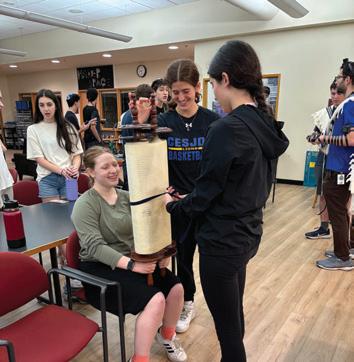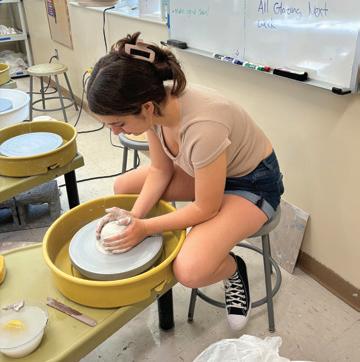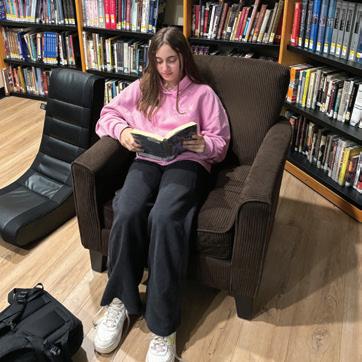THE LION’S TALE



From whispers amongst friends to incognito porn searches, conversations about intercourse are frequently left in the shadows. It’s about time we bring them to light.
amongst friends to incognito porn searches, conversations about intercourse are frequently left in the shadows. It’s about time we bring them to

Coach of many fields High school teacher coaches four sports 23 Find your taste How to discover new music


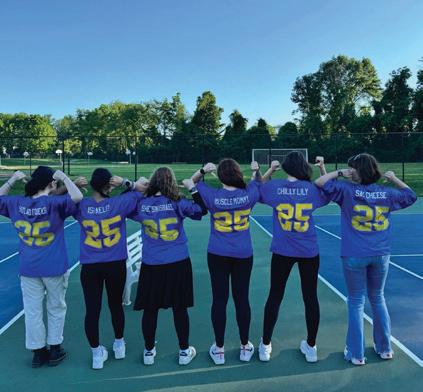

Editors-in-Chief
Stella Muzin & Lily Rulnick
Managing Editor, Copy
Aliza Bellas
Managing Editor, Web
Ari Kittrie
In-Depth Editor
Gigi Gordon
News Editor
Penelope Terl
Features Editors
Vivi Ducker & Ruby Kotok
Opinion Editors
Maiya Blumenthal & Sophie Schwartz
Arts and Entertainment Editor, Director of Social Media
Cati Werbin 19 Scout savvy Junior inducted into honor society
Arts and Entertainment
Sadaf Zadeh
Sports Editors
Tali Loeffler, Mia Forseter & Eliana Wolf
Multimedia Editor
Abby Chesman
Reporters
Gila Safra, Jordana Dauber, Isaiah
Segal-Geetter, Leora Blumenthal, Lindsey Shapiro, Jonah Mellen, Anna Polon, Jonah Mitre, Aviv Stein, Sophia Leinwand, Adam Salomon & Eliana Abrams
Staff Adviser
Jessica Nassau
Adviser Emerita
Susan Zuckerman
Which editors went to Camp Ramah this summer?
2. Which editor played softball over the summer?
3. Which two editors went to an Olivia Rodrigo concert together over the summer?
4. Which editor was a medical assistant this summer?
5. Which editors spent time in Israel this summer?
6. Which editor spent time in Texas at NASA this summer?
7. Which editor attended their ninth summer at Capital Camps?
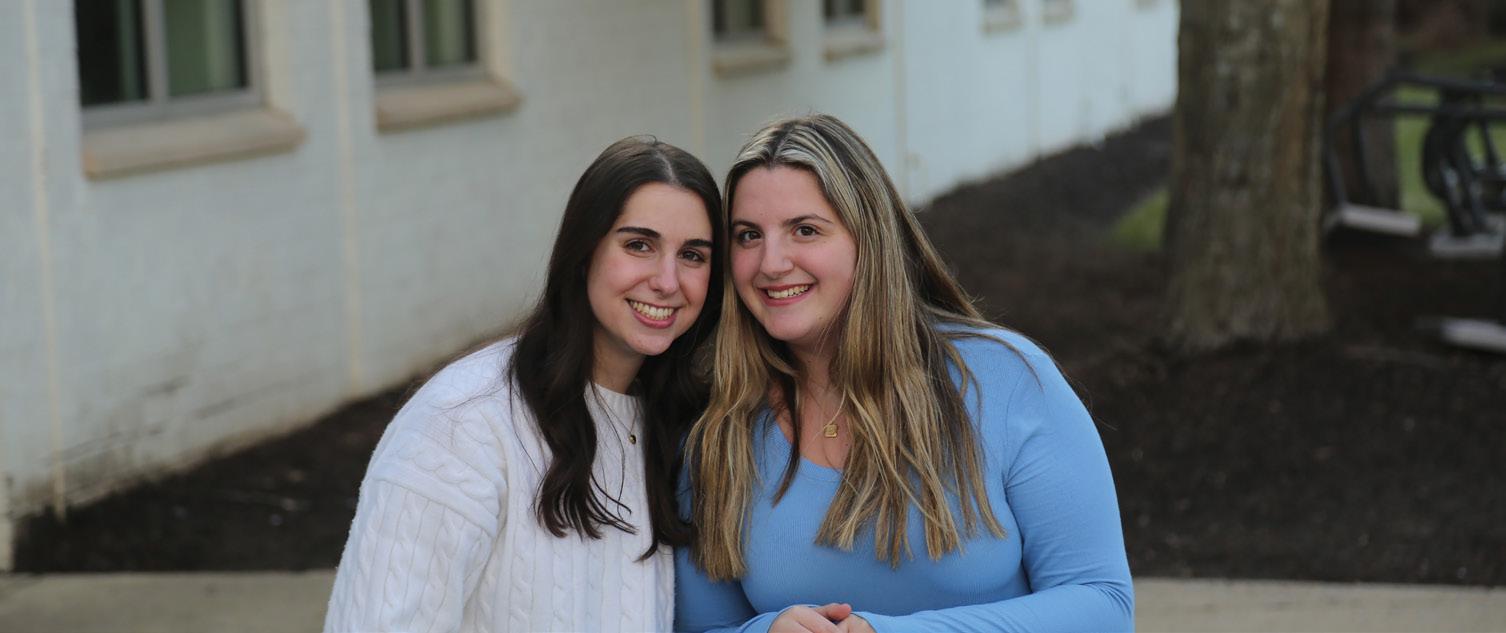
Welcome to the 2024-2025 school year. After a long summer, we are so excited to be back in the Pub Hub.
Although we enjoyed our summers, we want to acknowledge an event that happened towards the beginning of break. The Boiling Point, the student newspaper of Shalhevet High School in Los Angeles, was censored by their own administration and was forced to take down an article about the Israel-Hamas War. We are extremely disappointed to see censorship happening to high school publications, especially to another Jewish high school that we have maintained a close relationship with for years.
This reminded us of how lucky we are to have a Press Rights Protocol. This protocol ensures that the Lion’s Tale and our staff can write as we see fit without censorship from CESJDS staff or administrators. We are extremely grateful to have an administration that supports student journalists’ First Ammendment Rights and an adviser who helped us gain and understand them.
that is often censored: sex. We worked very hard on this article and the spread that accompanies it, and we are very excited for it to be read by our pluralistic community.
Outside of the In-Depth, this edition contains articles on finding your music taste, the new phone-free policy at CESJDS and many more.
Producing an edition over the summer is always a challenge, and this year was no different. However, we were able to create a great edition, which we could not have done without the help of our staff. We are so appreciative of all our editors and reporters for taking time out of their summers to help with the issue.
We are excited to be starting our senior year, and as we do so we have found ourselves reminiscing on the past three years of high school. Going into this year, we want to remind all of you to slow down and enjoy life. We know it is easy to get wrapped up in stress, but it is important to remember to be present. We wish you all an amazing start to the school year.
Sincerely,
Because of our Press Rights Protocol, staff members of the Lion’s Tale are able to write articles that might seem out of the ordinary. For example, this edition’s In-Depth article covers a topic Editors-in-Chief


New Upper School vestibule
Lily Rulnick, Editor-in-Chief
Rabbi Malkus stepping down Eliana Wolf, Sports Editor
Show staff more support
Tali Loeffler, Sports Editor
Pay attention to global conflicts
Stella Muzin, Editor-in-Chief
Montgomery College students
Vivi Ducker, Features Editor
Joe Vogel’s campaign
Adam Salomon, Reporter
“It Ends With Us” review
Vivi Ducker, Features Editor
Back to school fashion Friday Eliana Abrams, Reporter
Teams we would like to see Eliana Wolf, Sports Editor
Varsity softball wins again
Tyler Portnoy, Reporter

As the student newspaper of the Charles E. Smith Jewish Day School, The Lion’s Tale is a public forum for student opinion and expression. All content is determined by students. Its purpose is to inform the CESJDS community and to express the views of its staff and readers. The staff has made every effort to ensure the accuracy and objectivity of its news. Signed columns reflect the opinion of the writer; staff editorials reflect the opinion of the majority of The Lion’s Tale editorial board. The Lion’s Tale staff welcomes letters to the editor and
guest columns, which must be signed. The staff reserves the right to refuse any material and may edit letters or columns for length, clarity, libel, obscenity and/or disruptiveness. All other contents copyright of The Lion’s Tale. All rights reserved. Submissions may be emailed to jdslionstale@gmail.com, mailed to The Lion’s Tale or brought to room 320.
The Lion’s Tale news magazine and website is funded by The Simon Hirshman Endowment for the Upper School Newspaper and The Kuttner-Levenson Endowment for the Upper School Cul-
tural Arts and Student Publications.
AI is not permitted for any generation of content or brainstorming, including but not limited to the following: writing articles or headlines, spread designs, photography, audio or video. The only AI usage permitted by The Lion’s Tale is for the purpose of transcribing interviews.
The staff will adhere to the ethics policies of The Society of Professional Journalists and the National ScholasticPress Association. The adviser will be held to the Journalism Education Association’s Adviser Code of Ethics.
CESJDS community welcomes new Assistant Head of School

Sophie Schwartz OpinionEditor
Since its founding nearly 60 years ago, CESJDS has not had an Assistant Head of School. However, that changed on May 16 when Julie Horowitz began as JDS’ first Assistant Head of School for Institutional Advancement and Strategy.
The necessity for this role was based on the “operational side” of JDS, according to Head of School Rabbi Mitchel Malkus. JDS wants to bring in more students and share more about JDS around the community, which they hope that this role will help them to achieve.
Horowitz will be responsible for overseeing the admissions, marketing and fundraising departments. She will help JDS strategize how to gain more stu dents, raise money for the school and continue to grow.
“We want to engage the broad er community more in what’s go ing on in JDS,” Malkus said. “...We think that bringing [Horowitz] on and then bringing all of those de partments together, but integrat ing that with what’s happening educationally, will allow us to do that better.”
For the past 30 years, Horowitz has been working in education and philan thropy. Towards the begin ning of her career, Horow itz worked in New York City in the public school system and in education non-profits. For the last 15 years, she led her own consulting firm that focused on education and philanthropy.
Traveling is one of Horowitz’s favorite things to do. She recently went to Paris with her husband and daughters. Photo used with permission.

According to Horowitz, there were two main factors that interested her in the job at JDS. One of these factors was her long background in education, fundraising and external engagement work. Additionally, during the COVID -19 pandemic, Horowitz switched her children from public school to Milton Gottesman Jewish Day School of the Nation’s Capital. Since then, she has seen how impactful the day school experience has been to her whole family, especially after the Oct. 7 attacks in Israel.
“This opportunity felt like this really interesting merger of my professional background and experiences, with my personal passions and identity, at a time where

it really felt important,” Horowitz said.
Director of Upper School Admissions Wendi Kaplan hopes that Horowitz’s background in strategizing will allow the admissions team to better understand what schools their applicants are coming from, and what other schools they can pull new applicants from.
“There’s been a lot of interest this year, especially after Oct. 7, from families coming from MCPS [Montgomery County Public Schools] or other independent schools,” Kaplan said. “I think one of our goals is always getting out into the community and out into the Jewish community and other feeder schools so we can give them the information about our school and just making more people aware of how amazing JDS is.”

In this role, Horowitz hopes to increase enrollment of families who may have never considered Jewish day school before. Additionally, she hopes to increase individuals’, funders’ and the Jewish community’s financial commitment to JDS.
“This moment in the Jewish community is a really important one for just leaning into the role of Jewish education and embracing pluralism … really educating the next generation of Jewish leaders that we need,” Horowitz said.
Jordana Dauber & Mia Forseter Reporter,SportsEditor
The Grading for Learning policy that was introduced in the 2023-24 school year brought many changes to CESJDS’s grading policies, making it difficult for many students to fully understand the school’s policies. For the 202425 school year, teachers decided to form a more consistent set of guidelines that helps student follow the policy put in place.
Starting second semester of the 2023-24 school year, the Teacher Task Force on Grading for Learning met every other week to find ways to help implement Grading for Learning philosophies and practices within the school.
This summer, many teachers at JDS (including ones not on the task force) also went to a conference with the National Association of Independent Schools (NAIS).
English Department Chair and Head of the Teacher Task Force on Grading for Learning Melissa Fisanich, along with other members of the task force, decided on four rules every teacher must follow. The four rules are: a minimum grade of 50% in the gradebook, the use of rubrics for grading summative assignments excluding tests, no progressive late penalty to the student’s grade for late work and retakes and redos will be offered in accordance with the department’s policy. While these four rules are set in stone, teachers will still have freedom to decide how to interpret other guidelines.
“It’s a philosophy that aims to make grading more accurate, more bias resistant and more motivational for the students,” Fisanich said.
The task force focused on a couple of policies from the past school year, one of which was the late work policy. In the coming school year there will not be a late work penalty, but work is still expected to be turned in on time. Students may ask for an extension if they need extra time. The task
force has also focused on retakes, redos and retries.
“There were definitely some problems with [our] practices,” Fisanich said. “I think students were inadvertently taught to regard points as payment for work. And in a pluralistic Jewish day school are those our values? That we work for the payment of grades? Or is our value that we value our learning for learning’s sake? Our grading practices kind of didn’t line up with that, so that’s sort of what we’re after with this.”
Some of the new policies in the 23-24 school year included more retake opportunities, as well as a distinction between summative and formative assignments. In the past year some assignments were summative, while others, including most homework, were formative. This policy was different from previous years.
“[The retake policy has] been super helpful to me,” sophomore Lilah Sacks said. “It gives me a chance to show that I relearned the material that I didn’t understand as well the first time.”
Despite not being on the task force, High School Math Depart-
ment Chair Reuben Silberman was one of the teachers who attended the conference this summer.
“I especially don’t like giving grades when students are … making decisions about what they’re going to do with their time and what they’re going to do with their energy that … are not actually helping them think and helping them learn,” Silberman said.
At the beginning of the summer, the teacher task force hosted a student panel to get feedback on what had and had not worked throughout the past year. Sacks, along with 14 other students, participated in this panel.
“[The policy] gives students the understanding and the ability to make mistakes, which is how you learn,” Sacks said. “And second chances give people opportunities to learn the material better and then they can do better.”

Stella Muzin Editor-in-Chief
In the past few months, schools across the country have been banning smartphone use during the school day. In fact, according to the AP News, most schools already have restrictions on smartphone use. Additionally, the New York Times says these bans are getting even stricter in the upcoming year. Over the summer, CESJDS joined this trend when administrators announced that the Upper School campus would be going phone-free.
Over the past year, an abundance of new studies and research have come out citing the danger of cell phones for teenagers, specifically regarding social media.
On June 17, U.S. Surgeon General Dr. Vivek Murthy asked Congress to require warning labels on social media platforms, saying that many have “not been proven safe.” This, among other research, is what prompted JDS administrators to start discussing a new smartphone and smartwatch policy, according to Head of School Rabbi Mitchel Malkus.
We hope this policy helps cultivate deeper conversations and relationships.” “
-Dr. Lisa Vardi
Although the announcement of the policy officially came in June of 2024, discussions of this change have been underway since June of 2023, according to High School Principal and Head of Upper School Campus Dr. Lisa Vardi.
Vardi held discussions with the high school leadership team to discuss the option of a phone free campus, and Middle School Principal Cassandra Batson simultaneously held discussions with the middle school leadership team.
“I posed the question to my leadership team of, ‘should we move to this [a phone free campus]’, and what really surprised me was how many of them said yes,” Vardi said. “More and more people are coming out and saying that what we really need is to create a phone-free space for students, at least in school, to see if this could improve academic performance and student engagement.”
Vardi and Batson proposed the idea of a phone-free campus to Malkus, who was on board with the idea. Eventually, they sent the first of three emails to community members on June 17.
“Research has shown us that having them [smartphones] in schools cuts down on the positive social interactions between students that we want to be seeing at school,” Malkus said. “For that reason, we think a phone-free campus will be beneficial.”
As a part of the first email, a survey was sent out for parents and students to share their feedback on the policy. According to Vardi, this was done so that while the administration was crafting the specific guidelines, they could also try to find solutions to potential concerns.
On Aug. 9 and 16, two more emails were sent out with more details of the official policy. The emails outlined that when students enter the building, they will put their phone into a pouch created by the company Yondr, which can only be opened via a magnet that will be in the school’s security entrance.
Vardi says that the pouches were chosen for many reasons, one of which being that they may alleviate safety concerns.
“We sent a survey to parents about the new policy and many of them questioned the security aspect of what if something happens in the building and my child does not have their phone,” Vardi said. “That is one reason why we think using the pouches is the
Students enter school and place their phones in the Yondr Pouch
The Yondr Pouch is then closed and sealed, locking the phone inside
3
Students keep their own pouch with them throughout the school day
4 At the end of the day, students tap their pouch on a Yondr Base to unlock it
right approach because if needed, the pouches can be cut open with scissors.”
Additionally, many students were concerned about being able to access their phones during off campus lunch, and Vardi says that since the Yondr pouches can easily be opened with a magnet, which will be in the vestibule, students will be able to access their phones during that time.
Although the administration has attempted to ease student and parents’ initial concerns of a phone-free campus, many students are still unsure if this policy is the right choice for JDS.
“I understand the idea behind the policy, however it feels very inconvenient for me as a student,” senior Dalia Epstein said. “There are times where I use my phone for class work, [and] also it is helpful to have my phone if I need to reach my parents or friends throughout the day.”
Although the policy is new and there still are concerns, the JDS administration has high hopes for how it can improve the school environment in the upcoming year.
“We are adopting this policy not only to improve academic performance and student engagement, but also because we want students to socialize more,” Vardi

Tali Loeffler SportsEditor
History and Social Science Teacher
History teacher Dana Foster is one of three new teachers who will be joining the high school faculty this year.
Foster grew up in Montgomery County and attended the University of Maryland. Earlier in her career, Foster was a civics teacher trainer where she taught other educators how to teach civics, and most recently, worked as the Education Director at B’nai Shalom of Olney Congregation in Maryland.
From a young age, Foster wanted to be a teacher. She enjoys working with students and helping them understand and connect to history. Earlier in her life, Foster felt she did not know enough about the government and was eager to learn more, which sparked her interest in history. She also attributes her love for history to her tenth grade history teacher who inspired her passion for sharing history with others.
“My biggest goal is for students to see history through the lens of their own eyes and the lens of current days,” Foster said. “So many times people are like ‘history is so boring,’ but history isn’t boring if you are able to connect it to your own life. So when we talk about Ancient Rome and their foundations of government and how that impacts [the upcoming presidential] election this fall, what is the thread that connects history to today?”
Foster encourages student-centered learning and more cooperative group work during class. She favors hands-on activities that allow students to be continuously active and participating.
“I hope to help them [students] discover their wings and figure out their paths forward,” Foster

This year Foster will be teaching freshman and sophomore history classes at the ECP level. She is excited to join the CESJDS community and looks forward to the coming year.
“I’m really excited about the kehillah,” Foster said. “We just had our three days of the teacher training, and everybody has just been so warm, so supportive, and I’m just so excited to be in a community with students and teachers and administration that [are] so caring for each other and that that’s part of the mission, that we care for each oth-

Favorite Color Foster: Pink
Friedman: Yellow
Favorite Season
Foster: Summer
Friedman: Fall
Favorite Subject
Foster: History
Friedman: Jewish Text
Jewish Text Teacher
Returning from a year living in Nairobi, Kenya, Maharat Ruth Friedman is the newest addition to the high school’s Jewish text department.
Friedman spent the year with her family in Kenya working as a visiting scholar at the Nairobi Hebrew Congregation. Previously, she worked for ten years as a clergy member of the Ohev Sholom Congregation in Washington, D.C.
Friedman attended Barnard College in New York, and later went on to be among the first graduates of Yeshivat Maharat, one of the first yeshivas to ordain women for the Orthodox clergy, founded in 2009. In her role at Ohev Sholom, she became the first woman to be the sole leader of her open Orthodox shul.
As JDS is a pluralistic school with students from many different Jewish and cultural backgrounds, Friedman hopes to create an environment for many different opinions and beliefs to coexist. She hopes to encourage collaboration and discussion between beliefs while studying Jewish texts.
“I feel very passionately about helping people, helping students find meaning in [Jewish literature and Torah], in their own way,” Friedman said. “I don’t believe that everything will resonate with everybody, but I do believe that there is something for everybody.”
Friedman is also looking forward to studying and teaching Torah in an academic setting, such as JDS, that puts an emphasis on learning and encourages students to ask deep questions with its core value of Torah Lishmah, or love of learning.
This school year, Friedman will be teaching ninth grade Politics in the Age of Kings, tenth grade Talmud and 12th Talmud.
“I also think that it’s really important to be able to help students, particularly in high school, really find their own voice within all of these texts, some of which are 2000-plus years old,” Friedman said. “If there’s one thing I want students to leave my classes with, it’s knowing that they should feel empowered to find their own voice within these texts.”
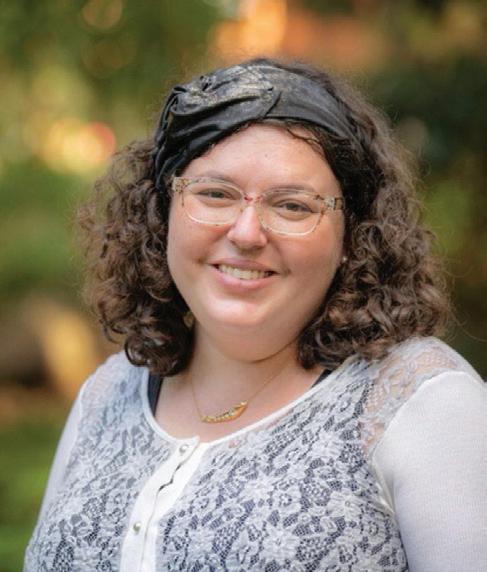

When was the last time you recall having a civil political conversation with someone? Unfortunately, it may be hard to think of any example, considering how our world has become extremely politically polarized. Political discussions have become impertinent conversations where both parties want to “win,” rather than try to understand the others opinion. If we continue on this path, it will be impossible to make progress in society.
According to Pew Research Center, more than 8 in 10 Americans say that general political debate and discussion in the country has become less respectful. As the presidential election draws closer, this polarization is exacerbated as the country divides themselves between the two main candidates.
Living in the Greater Washington area, we have the unique opportunity to witness the election at the front lines. We will inevitably be faced with people who have contradictory opinions to our own. However, we must go into conversations openly, not trying to change their opinions but rather understand it.
These issues do not just apply to adults; this is a growing issue in schools as well. In 2022, a Stanford study found that kids as young as sixth grade are learning to distrust and dislike each other based on political disagreements.
These children are young and impressionable, and are the future of American politics and society.
We are fortunate that CESJDS offers opportunities to engage in open discussions on political issues. For example, the Arab-Israeli conflict course offered to upperclassmen, which offers students many perspectives, and allows for conversations open to all opinions.
Another opportunity that is not unique to JDS is debate club. There, students are taught to prepare for discussions in which they know they will be disagreeing, but prepare to argue both sides to understand both perspectives. Students are encouraged to maintain proper decorum with the threat of losing points. This is a skill that can and should be applied to real political conversations.
Another opportunity for political discourse at JDS is the
student-run Political Discussion Club, which meets every Tuesday to discuss controversial topics in a civilized way.
When not in environments that are specifically designed for civil discussion, it can be hard to maintain these standards. Especially in the age of social media, where people defensively and aggressively share their views online, it is difficult to actually engage in respectful conversations. Therefore, we must take the opportunities that JDS offers and the values we learn from them to participate in civil political discussions. Though we cannot control how others react to our opinions, it is crucial we maintain civility so that conversations can remain productive.
“For Democracy, Talking Is More Important Than Agreeing” University of Virginia, School of Education and Human Development
“Embracing Civil Disagreement” Stanford Report
“Why Is Civil Discourse Important?” Gonzaga University

Go in open to new ideas

Don’t expect to change others’ opinion or feel like you neeed to change yours
Stay level headed
Ask questions to understand others’ opinions better


Try to find common ground

Gigi Gordon In-DepthEditor
Almost everyone can think of a time when they were sitting in a silent classroom, willing their stomach not to grumble. Or maybe you just get so hungry that all you can think about is lunch. But what if it is only first period and you forgot to bring a snack?
Bringing back vending machines would solve this problem. When students are hungry and need a quick snack, they should not have to wait hours to get one. Without a vending machine, students are often forced to wait hours for nourishment.
Having a vending machine is something that is very common and feasible for schools. Public and private schools everywhere have them dispersed throughout the buildings. In fact, CESJDS had vending machines up until three years ago. The machines stayed in the cafeteria and was accessible to all students. It was an easy, convenient way to get a snack or drink between classes.
According to High School Principal and Head of Upper School Campus Lisa Vardi, the school was not actually sure who owned the machine and didn’t profit from it, so they got rid of it. In the future, the school could purchase the machine themselves and could even get a refurbished one for cheaper.
While the initial investment in the machine itself is fairly expensive, vending machines are very quick to turn a profit. This is because snacks are very cheap when bought in bulk and the machines put a large upcharge on them, often leading to a higher profit margin overtime.
While the school store does provide snacks, it is only open during lunch and is not as reliable
Vending machines should be brought back to JDS
as having a vending machine that is open at all times.
Not only does a vending machine benefit students during the day, it is also helpful after school hours. Students who have to stay at school for sports or clubs are often in need of an afternoon snack. Instead of going across the street, a vending machine would make for a much quicker way to get one.
One concern there may be with bringing back vending machines is that students will use them during class. While this is not preventable, it is also not really an issue at all. If a student is so hungry during class that they need to get up and buy a snack, they should be able to. It is just like going to the bathroom during class: if you need to, you can.
The reality is that there are no real harmful effects of bringing back the vending machines. They are exactly what the student body needs to get through the long day and avoid getting hangry.
Japan has the highest number of vending machines per capita of any country. With over five million vending machines, there is about one machine per every 25 Japanese residents.



Ari Kittrie ManagingCopy,Web
There is a saying in American culture: “Football is life.” While this may sound corny, for so many in this country, that saying is completely true.
American football, a sport watched by a majority of households in the country, according to S&P Global, and played by over one million high school and college students, according to the

CONEliana Wolf SportsEditor
Growing up, I was constantly told by my neurosurgeon grandfather to always “wear a helmet” or “protect that head at sports,” as he warned me of the dangers of lasting brain damage. Seeing CT scans of damaged brains of patients who lost their cognitive abilities gave me perspective on the harms of brain trauma. It is terrifying to think that athletes would choose to participate in a sport as dangerous as football.
Football Foundation, is crucial to the American way of life. There are numerous benefits to having football in our communities, both socially and economically.
At the high school level, football can serve as the glue that binds a community together. Every weekend, teenagers gather at their schools to watch football games and support local athletes. They are often joined by their family and neighbors who all come together to support the local high school. This creates a positive atmosphere that not only encourages community-building for the non-students but it also promotes school spirit for the students.
Not only is high school football crucial for the United States socially, but it is also economically beneficial. According to the Daily Journal, a Northeast Mississippi-based newspaper,
According to a Gallup Poll, tackle football is the mostwatched sport in America. Americans of all ages and demographics love the sport and many parents find great pride in sending their young children to tackle football teams. Despite the cultural importance that the NFL and tackle football bring, there are serious consequences for tackle football players that drastically affect their later lives.
The Alzheimer’s Association classifies chronic traumatic encephalopathy (CTE) as a condition caused by repeated blows to the head, leading to lowered life expectancy and the development of dementia. There is no treatment for CTE, however there is a way to stop it at the source. According to the National Institute of Health (NIH), tackle football players are the biggest CTE patient group. Every year of tackle football
football ticket sales at one Mississippi high school, Pontotoc High School, accounted for almost 70% of the athletic department’s revenue. For underfunded schools, cutting football would cause a huge drop in their revenue. As a result, they would not only be forced to spend less on athletics, but also on the rest of the school’s needs.
Another example of football’s economic advantages is when the Los Angeles Rams moved from St. Louis to SoFi Stadium in Inglewood in 2017, which caused the city to experience huge economic growth. According to the Daily Breeze, a Los Angeles-based newspaper, Inglewood had a 17.5% unemployment rate before the creation of the stadium which decreased to 5% after. This means that many local residents now are able to earn an income close to home when they couldn’t before,

In 2022, the NFL made $18.6 billion dollars


In advertising revenue, the NFL made a record of $600 million dollars from the 2023 Super Bowl
“No amount of positive outcomes from a sport is worth lasting brain trauma.”
- junior Eliana Wolf
results in a 15% increased chance of CTE.
To a child, playing football is a fun activity, not a sport that likely leads to disastrous chronic disease later in life. With children’s brains and therefore judgment not fully developed, adults must discontinue their children’s participation on tackle football teams, as they can save kids from lasting brain trauma later in life.
Sports are an outlet for competition, foster team work and provide regular exercise opportunities. Athletics are an important developmental activity for children and a way for them to gain skills crucial for interacting with the world. However, no amount of positive outcomes from a sport is worth lasting brain trauma.

In 2024, there are endless options for children to play sports. Baseball, basketball and even flag football are all examples of sports

all thanks to American football. Without a football stadium or team, cities like Inglewood would struggle economically. Similarly, high schools in rural or poor parts of the country without sufficient funding or affluent Parent Teacher Associations (PTAs) would have even more limited resources for school activities.
There is no denying that football may not be the safest sport out there. But then again, most sports carry some element of risk. Football is an indispensable part of American society. So, why not celebrate all the ways this quintessentially American sport enriches our lives?

Penelope Terl News Editor
When the final bell rings at the end of a school year, many students look forward to two months of no academic stress. However for me, this stress never really goes away as there is still one more assignment encroaching on summer relaxation: summer reading.
At CESJDS, incoming freshmen, sophomores and juniors are assigned required reading. For most grade-level classes, summer reading is usually one book, while the advanced classes usually require two. In addition to this, some of the history and math classes also require work.
major issues, they’re little things that distract from the two months meant for de-stressing.
Many, if not most, students dedicate their time to something in the summer that takes up as much time as school usually does, whether it be an internship, a summer job or summer camp. Numerous JDS students go to sleepaway camp for up to eight weeks of the summer. This can make it hard to complete summer work, and leads to cramming at the end of the summer. Although it’s possible to bring the book to camp, it can take away from the fun of camp.
However, a study done by the Northwest Evaluation Association shows that many students, on average, lose up to 20% of progress made during the school year over their summer break. So, there needs to be a way to balance the importance of summer vacation and the need to keep up in school.
that share similar characteristics as football, but without nearly as much proven risk of early onset dementia or CTE. With so many alternatives, it is illogical for tackle football to be offered in school sports, as it can set children up for suffering and cognitive issues later in life. While tackle football brings a sense of community in schools, cities and even countries, there are easy ways to pivot those communities to safer sports, as most are rallying for the team itself, not necessarily the sport.
Starting children on tackle football teams at a young age is unnecessary and cruel to children who cam potentially become attached to the sport. It is upon adults to limit the amount of tackle football played, as no sport is worth easily preventable brain damage.
While I understand the value behind summer work—staying up-to-date on skills, enrichment during the summer and prepping for the upcoming school year—I believe that the positive effects of summer work do not outweigh the negatives.
Summer vacation is meant to give students a break from the constant work and busy schedules they have during the school year. The summer time is also a time when students can grow non-academically, such as socially. Summer camp and other activities teach how to make new friends, interact with others and engage in healthy competition.
Having excessive summer work can put a damper on the months that are meant for relax ation. There are many examples of schoolwork infringing on summer fun, such as bringing summer reading to camp, do ing math problems in hotel rooms and annotating books on planes. While these aren’t
I think that schools should allow students to read books of their choosing. Some schools provide a list of books for students to choose from, or create a required minimum number of books students must read. This way, students are able to choose books of more interest to them, which promotes interest-based learning rather than mandatory reading.
I understand the intentions behind summer work. However, I don’t think that the potential ben-

From whispers amongst friends to incognito porn searches, conversations about intercourse are frequently left in the shadows. It’s about time we bring them to light.
Photo by Gigi Gordon, LT

Lily Rulnick Editor-in-Chief
Sex. A short three-letter word that, when stated, prompts the highest levels of discomfort, curiosity and secretism among humans. Whether the topic is introduced to children through a metaphor such as “the birds and the bees” or viewedby teens through movies and the internet, sex often seems to be viewed and discussed through unrealistic and unhealthy lenses, or not at all. Despite living in a time
when information is accessible to all and openness is being celebrated more than ever, the topic of sex remains taboo in conversation. Though privacy is important to maintain in everyday life, when does too much discretion create a harmfully uninformed generation? And if sex and reproduction have existed since Adam and Eve, what’s with the stigma surrounding the topic? Although sex can be awkward to talk about, it is crucial that it is discussed.
The percentage of teenagers who engaged in sexual intercourse decreased from 54% to 40% between 1991 and 2017
Sex in Pop Culture: “Tonight let’s get some and live while we’re young.”
When One Direction’s song “Live While We’re Young” was released in 2012, it was played everywhere: on the radio, at Bar Mitzvah parties, day camps and more. Because it was sung by their favorite boy band, little kids everywhere were singing along to it. What they didn’t know, however, is that they were really singing about having sex.
As society has evolved over the years, representation of sex in popular culture has increased. According to the Kaiser Family Foundation, in 1998, 54% of television programs discussed sex at some point during every episode. By 2005, this percentage jumped to 68%.
However, despite this sexual theme in modern pop culture, the Centers for Disease Control (CDC) reports that the percentage of teenagers who engaged in sexual intercourse decreased from 54% to 40% between 1991 and 2017.
Senior Josie Silverberg said the representation of sex in the media has its benefits, even though it largely contributes to the dramatic and extreme stigma surrounding sex.
“The idea of sex and one’s own sexual power has become a major theme,” Silverberg said. “ …’WAP’ [by Cardi B] is a great example of a woman claiming her own sexual power and not being afraid to show the female side of sex.”
However, Silverberg also feels that the portrayal of sex in modern media contributes to an extreme and over-normalized perspective on sexual activity that has its drawbacks.
“The boundaries that had existed previously, the shaming, all that stuff, that’s not as present,” Silverberg said. “On one hand, it’s positive, because things like slut shaming and all that stuff [has] been reduced slightly, but at the same time, this pressure has built up.”
According to a survey by Rasmussen Reports, parents are also concerned about the media’s portrayal of sex. In 2013, 71% of surveyed adults agreed that popular culture “encourages sexual activity among young people” in a way that didn’t previously exist in prior generations.
“I find the portrayal of sex in the media quite disturbing, to be honest,” Mary*, the mother of both middle and high school students at CESJDS, said. “I think that there’s no need for the openness we see on TV.”
In recent years, more teens have viewed explicit sex through online pornography. The Oxford Dictionary defines pornography as “printed or visual material con-
taining the explicit description or display of sexual organs or activity, intended to stimulate erotic rather than aesthetic or emotional feelings.” One of the biggest pornography websites globally, Pornhub, reported a study that showed 42% of youth between the ages of 10-17 view online pornography. In past generations, viewership ratings like this were impossible with significantly less technology.
According to a recent New York Times article by Peggy Orenstein, one of the most harmful effects of this increase in teenage viewership is pornography’s portrayal of sexual strangulation, which is refered to as choking. Director of the Center for Sexual Health Promotion at Indiana University Dr. Debby Herbenick conducted a survey of 5,000 students asking if they had ever been sexually strangulated, and two-thirds of the women surveyed reported that they had been choked during sex. Thirty five percent of these women were between the ages 12 and 17 upon their first encounter with strangulation.
Both explicit pop culture and porn have completely altered the way adolescents view sexual activity today. Though dialogue around sex is becoming increasingly normalized, that same normalization has contributed to a new generation that is misinformed by pop culture as a whole.
“I think showing sex as this casual, has no consequences, ‘be with whoever you want to’ ap proach is just not reality in many ways,” Mary said. “It causes harm to young boys and girls because it creates this unrealistic image in their heads.”
Sex Education:
Across the country, sexual education has been substandard for years. The CDC estimated that only half of the country’s high schools and one-fifth of middle schools teach the topics that the CDC deemed essential for sexual education. In 2022, the Guttmach er Institute found that more ado lescents received sex education in 1995 than between 2015 to 2019. Since its founding in 1965, JDS has had many different forms of sexual education. According

Usage of birth control decreased by 9% among female teenagers between 2002 and 2019 84% of parents support having sex education in middle school


49.7%
of sexually active female teenagers reported their partners used a condom during their last sexual encounter

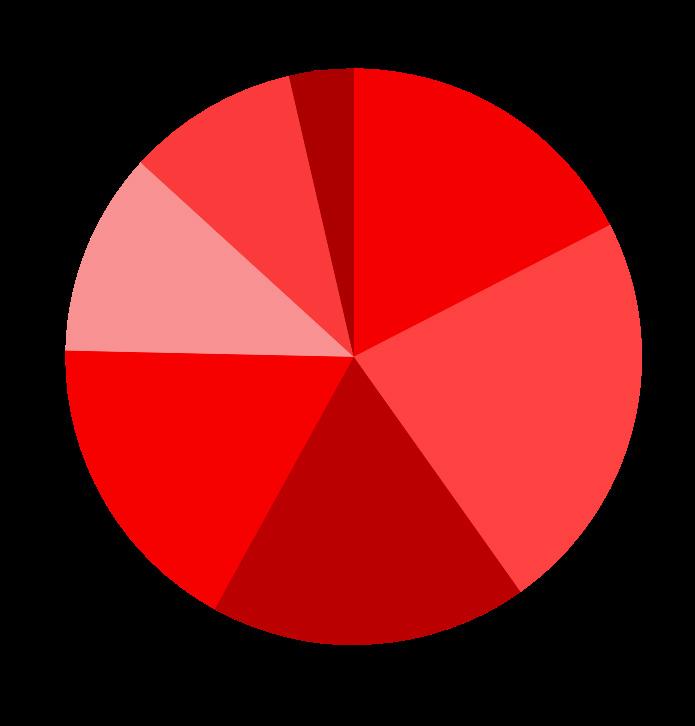










to Dean of Students Roz Landy, JDS used to require a course for ninth and tenth grade called Human Development, which covered topics like drugs, sex and alcohol through a Jewish lens. The course later shifted to eliminate the Jewish component, and was taught by physical education teachers.
Soon, however, administrators realized that this type of sexual education course was not the right fit for high school students. Landy said they decided to hold sexual education in middle school instead of educating people when it was “too late.”
Middle School Assistant Principal Rabbi Janet Ozur Bass said that the middle school sex ed curriculum mostly consisted of conversations about healthy bodies and healthy relationships, covering topics like consent and body positivity. She said the administration decided that the students needed classes beyond basic anatomy. With this in mind, Ozur Bass began to incorporate Jewish values into the new curriculum.
“Our philosophy is twofold,” Ozur Bass said. “One is that we need to base all of our curriculum in Jewish values. And two, we need to meet the needs of a pluralistic, dynamic school … so that our students feel good about their bodies and are making educated choices and understand what role … not just Jewish law, but Jewish values, have to teach about our bodies and our relationships.”
Zoe Wertlieb (‘22), a current junior at Bryn Mawr College, thinks it is extremely important to have a strong sex education program, considering that a non-positive experience can contribute to the sexual stigma.
Wertlieb recalls one session of sexual education in seventh grade in which she and her female peers in her grade and the grade below her learned about periods and how to use female hygiene products.
“I think at that point, a lot of my friends have gotten their periods, myself included, and so I remember us feeling like it was inappropriate for us to be with the sixth graders, because our experiences are different from theirs,” Wertlieb said.
Wertlieb said all sex ed should be a co-ed experience, ensuring
that members of each sex can learn about the other’s anatomy. Above all, Wert lieb believes that JDS has room to incorporate more topics and expert educa tors into its curriculum. For instance, Wertlieb would have appreciated learning about birth control, includ ing its side effects and al ternative methods, during her time in high school.
“At the end of the day, these are things in hetero sexual relationships that they’re going to be doing together, so why sepa rate them for it, right?” Wertlieb said. “That just feels counterpro ductive. And if you sep arate them, then it creates this message that it’s not some thing that boys and girls should talk about with each other, that it is something that should be sep arate between the genders, when it’s inherently not. It’s inherently the opposite, and it makes it more taboo.”
According to a study by Is sues in Law and Medicine, a lack of sex education can lead to inti mate partner violence and gender biases in addition to the direct dangers that could result from a sexual relationship.

Senior Navah Gris finds that JDS’ lack of sex education is dan gerous and contributes to the lack of knowledge within the current generation. Though sexual health is one of the topics covered in the school’s senior seminars, there is no specific sexual education built into JDS’ curriculum.
“The JDS high school sex ed is non-existent,” Gris said. “Besides for a speaker here and there, sex ed isn’t required even though it’s realistically a time when the in formation is the most relevant and useful to teenagers.”


Without proper sexual ed ucation, adolescents often turn to mediums like pornography to educate themselves. Orenstein conducted a survey of British col lege students where she found that 60% of the students surveyed “consult pornography, at least in part, as though it were an instruc tion manual,” as she puts it in her article.

In the same article, Orenstein




writes, “When do we explain the miraculous nuances of their anatomy? When do we address exploration, self-knowledge?” The answer is simple: school.
From a religious perspective, it is no secret that sex is a complex topic. Whether it is the emphasis on rules about abstinence before marriage or sex simply for the sake of reproduction, conversations about sex from a traditional Jewish perspective can often seem rigid and inflexible. However, upon closer examination, the truth is more complex.
It is important to remember that Judaism is a complex religion with many different sets of beliefs and interpretations of the text. Therefore, when broaching the subject of Jewish attitudes towards sex, what may apply to some Jewish communities is not necessarily true for all.



Rabbi Mitchell Berkowitz, the Associate Rabbi at B’nai Israel Congregation in Rockville, said that within Judaism, sex is looked at differently depending on someone’s marital status. He also said it varies based on denomination, and specified that he represents a Conservative perspective.
“I think the approach, generally speaking, to sex within marriage is different than the approach that Judaism has to sex outside of marriage,” Berkowitz said. “Within marriage, I would say that it’s something that is, generally speaking, celebrated and encouraged within certain parameters, and in fact, it’s often couched in the language of an obligation and a mitzvah.”
is celebrated within married, heterosexual Jewish relationships.
“Judaism does value and celebrate that part of a loving, healthy relationship between two people who are committed to one another, ideally through the lens of marriage,” Berkowitz said. “…Part of [a married] relationship is physical and part of that relationship is sexual … assuming that all of that, of course, is consensual,” Berkowitz said.
According to My Jewish Learning, the biblical word for marriage, kiddushin, comes from the same root as holiness, which is why some believe that premarital sex detracts from the holiness of the act.
The view of sex outside of marriage being unholy is shared among other religions that, according to a study done by Science Direct, contributes to the stigma surrounding sex for many different communities.
Conversely, Ozur Bass thinks it is very important to note the positive tone in which Judaism talks about bodies and sex. She thinks that, especially among other religions, the tone in which halacha (Jewish law code) is delivered is very unique.
“We are very, very blessed to be part of a religion that views sex and sexuality and our bodies in such a positive way,” Ozur Bass said. “…There are so many different ways to interpret the Torah, but no matter how you’re interpreting Torah, our bodies are a blessing.”
Most Common forms of contraceptives
1. Birth Control 2. 3. 4. 5. 6. 7. 8. 9. 10. Male Condom IUD

According to Berkowitz, consensual intercourse between spouses is celebrated in Judaism because of the Jewish values that it is associated with. Berkowitz explained that it is considered a mitzvah to have children, and therefore sex with the intention of procreating is encouraged between a married couple in the Jewish community.

Separately, Berkowitz explained that Jewish text obligates Jewish husbands to provide their wives with sexual activity at specific intervals in time, which is another explanation as to why sex
Looking Forward:
High school is a time full of firsts. The shift in media portrayal of sex and the lack of sex education have the capacity to pose a danger to the next generation, leaving many misinformed before entering into sexual experiences.
When we want to teach math to our children, we don’t wait until the point where they’re asking about math,” Ozur Bass said. “We figure out what is developmentally appropriate, and we anticipate and we lay the foundation and then we grow their math skills. It should be the same with the care and keeping of our bodies.”












9 out of 12 older adolescents report having ever engaged in sexual activity
Mia Forseter SportsEditor
Since she was young, senior Aliza Lesser knew she wanted to be a part of the Bronfman fellowship. Even in elementary school, she, along with other friends from her community, would talk about applying in high school. Throughout her high school experience, Lesser became more and more excited about the unique opportunity.
The Bronfman Fellowship is a pluralistic educational Jewish summer program that brings together teens with different Jewish backgrounds to learn, explore their Jewish identities and bond. The program has a focus on learning for the sake of learning, and brings in diverse teachers for seminars. In addition, students travel around the U.S. and throughout Israel.
After undergoing a long application process, including an in-person interview in New York, on June 25 Lesser and senior Shalvah Lazarus joined 24 other rising seniors from around the country and departed for Pearlstone Retreat Center to kick off their fellowship year. Almost at the same time, a group of Israeli teens known as Amitim met for their opening seminar for the fellowship.
A large part of the Bronfman fellowship is building connections. The community remains after the fellowship year, when fellows join an active 1,400+ member alumni
1 week in Israel during the summer 2 seminars during the school year following the fellowship 26 North American teenagers are selected to attend each year 20 Israeli teenagers selected each year information from bronfman.org
community and network.
“Definitely one of my favorite parts was just the people,” Lesser said. “...Just making a bunch of new friends, and getting to spend time with these people… was definitely something that was very important to me, and very fun.”
Over the course of four weeks, the American fellows traveled to and around Maryland, Boston and New York before departing to Israel, where they met the Amitim. Due to the Israel-Hamas war, American fellows only spent a week in Israel and the rest of their time on the East Coast.
Throughout the trip, the group went sightseeing, where they saw historical and popular landmarks such as the Freedom Trail in Boston, Old City of Jerusalem and the Dead Sea. During parts of the tour, they had the opportunity to learn from a wide array of speakers including relatives of hostages, Bronfman alumni and representatives from many communities in Israel.
“What really stood out to me was [the fellowship’s] ability to really choose amazing Jewish worlds, to send us in and expose us to,” Lazarus said. “For example, we visited the Chabad Rebbe’s grave and got to see that community in action.”
Lazarus and Lesser agreed that a highlight of the trip was
the conversations that people had about their learning outside of their seminars.
“Everybody on the program was very tuned into deep, meaningful conversations all the time,” Lazarus said. “So every bus ride, every meal, we talked about really, really interesting topics, and everybody was really engaged and excited to listen and share their thoughts.”
This is just the beginning for these students, as this fellowship meets via zoom once a month over the course of the year, and for a few days for an in-person spring and winter seminar. During this time, fellows chose a question, topic or idea to further explore with the help of staff and alumni.
As a culmination of the time in the fellowship they will present what they learned to other fellows. After, as an alumnus of the program, fellows are still able to meet through yearly collegiate gatherings on the East Coast.
“I’m really excited to have the new friends and the new contacts that I’ve made,” Lesser said. “I’ve just been calling up people from Bronfman, asking them questions, and we’ve been learning together and just carrying on those relationships and the learning that we’ve started on Bronfman, carrying that throughout the year, and hopefully for the rest of my life.”

Students spend the summer connecting with their Jewish identity around the world



Sadaf Zadeh Arts and Entertainment Editor
While many of his peers spend their downtime scrolling aimlessly on their phones, senior Gus Bookbinder has made it a point to avoid screen time. Bookbinder’s commitment was exemplified last year when he decided to give up the modern smartphone and switch to a less common flip phone.
The idea came to Bookbinder as he was transitioning into his junior year, when he realized he was spending more time on social media than doing things he genuinely enjoyed, such as reading. After a month of deleting different social media apps one by one, Bookbinder decided to purchase his first flip phone.
“I have so much more time now,” Bookbinder said. “And I really thought I was going to miss the scrolling and the social media. [But], a week after I got rid of it, it was like it had never been there at all.”
Gus has always been his own person, and he’s always been willing to do what is meaningful and healthiest for him, regardless of what other people are common path is.”
- Annmarie Hart-Bookbinder
Social pressure is one of the reasons Bookbinder had initially decided to download social media. With nearly all of his peers using apps like Instagram and Snapchat, it was easy for him to get lured into what he calls endless, unproductive


scrolling. However, Bookbinder did not spend much time on these platforms before he deleted them.
Now that Bookbinder has stopped using social media, he isn’t disturbed by the fact that he isn’t “snapping” his friends or liking his classmate’s Instagram posts, and his friends aren’t bothered by it either. In fact, his peers are supportive of his decision and many even find it refreshing to see.
“I think it’s nice to see someone dissociating from digital technology,” senior Noam Klein said. “...I would never; I just like my phone too much. But it’s inspiring.”
Many of Bookbinder’s peers have been very accommodating of the fact that he no longer uses social media applications, and even put in more effort to ensure that he is informed on plans and get-togethers.
“So there’s tons of times where people will say, ‘Let’s set up a chat. How are we going to coordinate this with friends for school and for, work things?’” Bookbinder said, “And I have to say, ‘I can’t do it like this and you should text or email me any updates.’”
Just like his friends, Bookbinder’s family appreciates the switch that he has made and even expected it from him.
“It was not all that surprising,” Bookbinder’s mother, Annmarie Hart-Bookbinder, said. “Because Gus has always been his own person, and he’s always been willing to do what is meaningful and healthiest for him, regardless of what other people are doing or what the common path is.”
Although he is still unsure of what device he will use to communicate in the future, Bookbinder aims to carry on the
Instead of conforming to our iOscentric world, Senior Gus Bookbinder opts to communicate through a fliphone
value of a distraction-free life
“It is possible that I could get a smartphone framework, a dumb phone, they’re called,” Bookbinder said. “It doesn’t have social media, it just has calling and texting. So it’d be a screen-like scroll, but it wouldn’t actually have any social media and things like that. That might be a thing that I do but I won’t be
Many flip-fanatics find the ‘snap’ of the phone to be appealing, yet others find it irritating
getting a traditional smartphone again.”
While Bookbinder’s lifestyle may differ from the norm, it has been insightful to the people around him, and has allowed them to consider their own screen time and how that impacts their lifestyle.
“I think it has made us more mindful about, ‘Are there days that we really don’t need to have [smartphones] with us all the time? What are the things that we rely on it for? And are there other ways? [to occupy ourselves]’” Hart-Bookbinder said.
8.5: Hours the average teen spends on their phone per day
>1: Hours Gus spends on phone per day

While smartphones require daily charging, flip phone batteries can last from a few days to several weeks
Lindsey Shapiro Reporter
Since 1998, seniors get personalized jerseys with their grade’s graduation year on them. It is a fun way to celebrate their final year, and show a tidbit of each student’s personality. They are worn on the day of the month that corresponds to their graduation year. For example, the class of 2025 will wear their jerseys on the 25th of each month.
Each year the students of the graduating class get to decide what to put on the back of Landy’s jersey. Last year, the class of 2024 decided to dub her “Rizz Landy,” a play on her nickname (Roz) and the internet’s obsession with Oxford English Dictionary’s word of the year for 2023, ‘rizz.’
As well as getting to wear their jer seys to school, seniors dress up in themed outfits to count down to their final day of school. Some notable themes from last year include rhyme without reason and neon. On the last day of school, the entire senior class wears their jerseys, adding a special flair to their final moments as high school students.

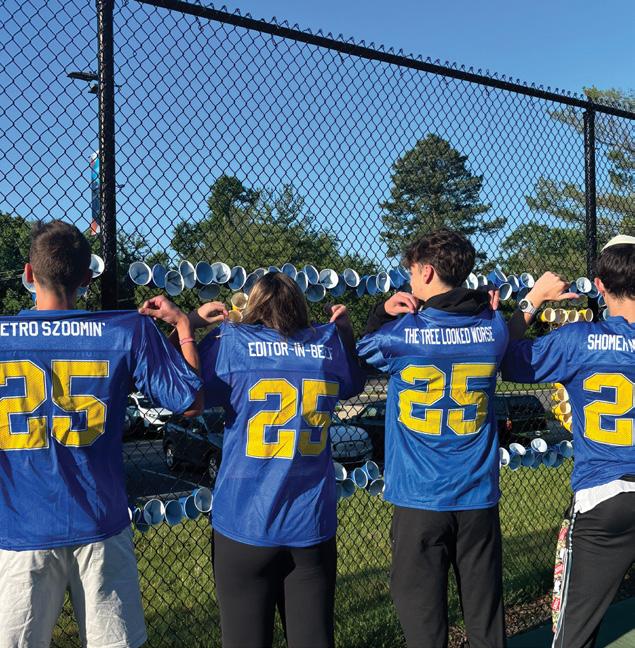
The main thing that sets prom at CESJDS apart from other schools is the fact that it takes place in February. Since the seniors graduate early, prom is right after graduation rather than in the spring like most schools.
On prom night, all seniors and their dates get to attend the dance, while also getting the opportunity to enjoy dinner, take pictures and ride on a party bus with their all of their friends.
JDS prom also includes an all night after-prom that takes place at the school following the dance itself. After prom is run and chaperoned by teachers and parents and has featured unique activities in past years including poker, a bouncy house and even a hired hypnotist. After prom also offers food and desserts, a pair of sweatpants for the whole class to change into and extra time to spend with friends.
“In 2017 that class came to me and said we want to do a dinner together [before prom] because we don’t want kids to split up,” Dean of Students and Senior Class Dean Roz Landy said. “That’s a new tradition that’s very special because it’s inclusive, and that’s what we want to be.”
Photo by Abby Chesman, LT & Dimensions
Every year, seniors get the opportunity to decorate the senior alcove in the high school hallway. Seniors’ lockers are located in and around the alcove, allowing everyone to be close to each other during the school day. The alcove also serves as a space to hang out with friends between classes, during free periods and at lunchtime.
The senior class is allowed to paint the walls, hang up pictures of their grade, small basketball hoops, decorations and numbers counting down to the last day of school. It is a senior privilege to get a space in the school that is their own to personalize and to be meaningful to each class.
“The main part is just that the alcove can be used by everyone at any time” senior Alana Udell said. “Every single senior hangs out in the alcove, so it’s not just one friend group’s area.”


While every school has their fair share of senior traditions, JDS has a few that really set it apart from other schools. One of the most impactful traditions for seniors at JDS is the trip to Israel and eastern Europe. In the second semester after graduation, students get to spend over three months traveling across Israel and visiting important sites in Poland such as many of the concentration camps.
“You learn a lot about the Jewish life that was there before and how amazing it was and how quickly it was washed out,” alumna Darya Dayanim (‘24) said. “I think that’s something you don’t really get in the classroom.”
During the trip, students get to learn the history about the places they are visiting, as well as getting to spend spring break in Israel. Last year, students got to choose from volunteer opportunities and were able to help businesses that were struggling after the events of Oct. 7. The trip typically concludes with a four-day hike, a great bonding experience for the grade, according to Dayanim.
Anna Polon Reporter
Almost everyone has heard of Boy Scouts, and many even know about its more challenging level, the Eagle Scouts. But few know about the exclusive Order of the Arrow, which junior Elie Arkin was inducted into last spring.
Elie has been a scout for two years and is currently a member of Troop 1131, a Boy Scouts of America (BSA) troop based in Burke, Virginia. Boy Scouts is one of the world’s largest scouting organizations, along with organizations from Indonesia, India and the Philippines, and has troops all around the nation for ages 11-17. Scouts BSA is a program for traditional scouting, which includes outdoor adventures and volunteering. Scouts BSA aims to train members in various areas, including leadership and fitness.
Elie’s troop meets once a week and has trips and other non-meeting activities. During meetings he does things such as educating younger scouts on information needed for upcoming trips and learning required skills, all while also having fun. Elie also
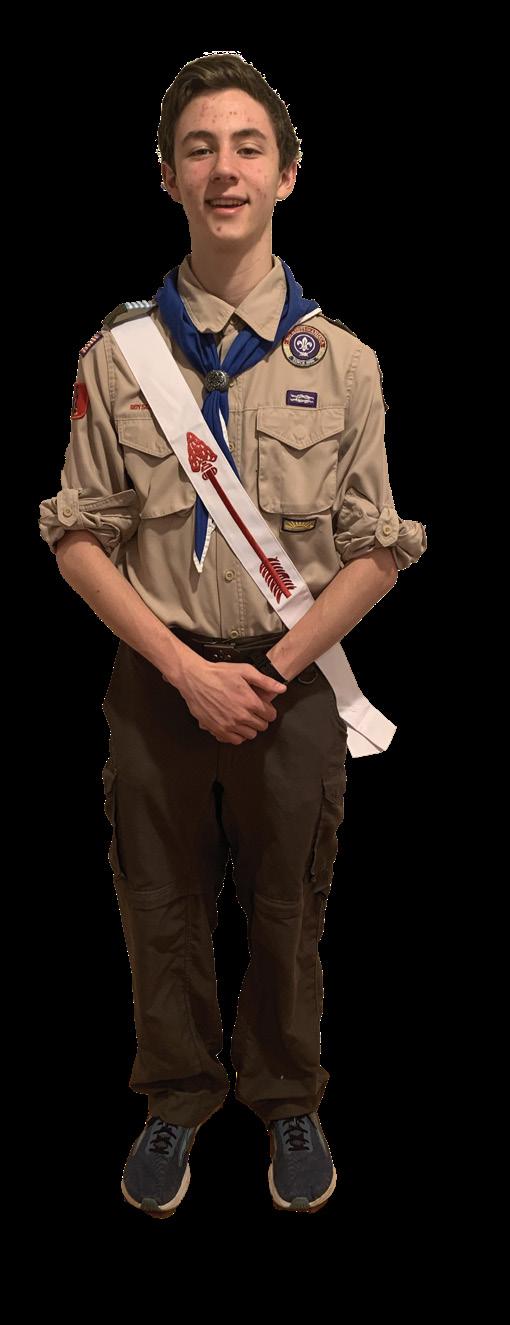
leads a group of 12-18 year-olds in their scouting activities including camping trips.
“I think I’m very blessed to be in a good troop with a lot of amazing people and adults in it, it has a very rich history,” Elie said.
The Order of the Arrow has over 160,000 active members. To be in the Order of the Arrow, scouts must be voted in by their troop, hold a certain rank and have experienced at least 15 days of Scout camping. It serves Scouts who embody the Scout Oath: a promise all scouts make to help others and obey the Scout law, which states traits scouts must embody, including loyalty and bravery.
In March, during one of their meetings, Elie’s troop voted him into the honor society.
According to Elie’s troop leader, Steve Lloyd, Elie was inducted because he was one of the older and more experienced scouts in his troop.
“I think everybody was really excited to elect him into it,” Lloyd said. “He was definitely easily voted in along with several other scouts at the time.”
After scouts are voted into the
NECKERCHIEF
Order of the Arrow, they must undergo a journey in the woods for a weekend with limited food and resources known as the Ordeal. Not only must they live off these resources, but participants must also take a 24-hour oath of silence. During Elie’s Ordeal trip, it was raining the entire time. According to him, he got about an hour of sleep.
Elie sees the Order of the Arrow as a way to continue developing his leadership skills while being part of a group that exemplifies scouting values.
“It’s an honor,” Elie said. “You’re elected, you’re chosen by your peers for something and it’s very nice to see. I appreciate it and I want to go back and help if I can help them.”
Elie is also working towards becoming an Eagle Scout, the highest rank achievable in Scouts BSA. His father, Uri Arkin, was an Eagle Scout in the early 1980s as well as a member of the Order of the Arrow, and he was the one who first encouraged Elie to give scouting a try.
“I’m happy that he’s involved in an organization that is positive and teaches a lot of life skills,” Uri said.
Elie is still deciding what project to do as his Eagle Scout required project, which must benefit a community. Uri recalls that his project was setting up a free library at a DC hospital.
Uri is happy that Elie was inducted into the Order, and is hopeful that Elie will become an Eagle Scout because it will “allow him to be an active volunteer well into adulthood” if he chooses.
Elie enjoys devoting time to BSA and appreciates all chances he gets to learn and experience things he wouldn’t otherwise.
“[In Scouts] you have leadership opportunities,” Elie said. “I don’t know if there’s a parallel at this age of going into the woods and just [being told] ‘Okay, you’re in charge of these kids. Have fun.’”



Boy scouts of america merit badges the order of the arrow badge rank patch for star rank council and troop patch



hough denim is one of the most timeless clothing staples, what’s fashionable changes year to year, even month to month. Denim is seen in many different settings: school days, nights out and even the red carpet. Here’s a look into some of the hottest styles and rising trends in denim. Jeans can be dressed up, down or sideways. But, a current trend emphasizes the simplicity of jeans instead of going all-out. With a pair of low-rise, relaxed-fit jeans (which can be found on Agolde, Gap or Levi’s), try pairing it with a plain tank top or baby tee. Let the simplicity of the

Overall, try to stick to the basics by keeping it simple and cool.
On the flip side, many denim devotees have been bold with their outfits by decorating their jeans with rhinestones and other flashy accessories. Studs, beads and sequins can now be seen bordering pockets, or forming intricate designs on any and all denim pieces. These embellishments add personality to an otherwise plain item, as well as add a personal touch to your outfit.
This trend is a throwback to the 2000s, with edgy, blinged-out looks flashing in our memories. Although these jeans can verge on tacky, if done right, they can truly make an outfit. Since embellished jeans are a relic of the 2000s, the best path to take in search of them is thrifting, buying on an online reselling site or making them yourself.
ries to allow the denim to have its own moment, a pop of color can easily spice up a double denim outfit. A patterned overcoat pairs nicely with a plain tee and feel free to make the outfit your own with a colorful platform shoe or sneaker.
Many people have seen, and hated on, the infamous Free People “barrel jeans.” With their fitted waist and ankle, barrel jeans flare out around the mid leg area, creating a silhouette that is strikingly different from most other styles. These jeans rose in popularity when TikTokers began purchasing and reviewing the style, and the response was not always positive. Many viewers disliked the silhouette, with negative comments under videos of anyone wearing the style. However, when paired with the right pieces, barrel jeans can earn their place as a respected style.
For those looking to elevate their outfit, chunky jewelry has become a huge hit. Large layered necklaces, statement earrings and bold cuffs can be
Denim on denim is often rejected by society. A denim jacket on top of jeans? Fashion treason. However, double denim outfits might just be in this year, if done right. Who What Wear advises readers to pair a more form-fitting denim jacket with a wider leg jean. Zara has a wide array of options, with various wide leg styles in different washes and cuts, there is also have a great assortment of both looser and tighter fitting denim jackets. With the added

To wear barrel jeans successfully, try pairing them with a fitted top to offset their exaggerated flare. Put on a few unique jewelry pieces to add dimension and excitement throughout the outfit, sunglasses, and a pair of flats, and you’ve got yourself a chic barrel jeans look.
Overall, jeans are a staple, making them versatile and suitable for each individual’s unique style.


Jonah Mellen Reporter
The colliding stories, humor, schemes and strange characters presented in the film “Election” make it an intensely enjoyable watch. The movie’s greatest virtue is its fun and thrilling storyline. As a fast-paced film about a high school presidential election and a tense rivalry between teacher and student, the plot of this film has a similar feel to a thriller without the action. You can find “Election” on Max, Roku or Prime Video.
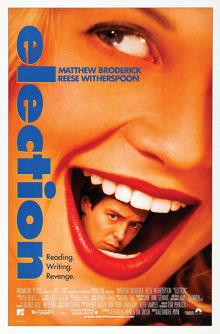
“Lady Bird” follows a high school girl’s relationship with her mother, and her trials and tribulations throughout high school. Greta Gerwig, who recently became known for her directing of “Barbie,” filled the film with humor, relatability and sadness. The music, acting and writing all blend together to create a beautiful environment and an intensely memorable movie. “Lady Bird” can be watched on Max, Hulu or Prime Video.


Heartbreaking, heartwarming and hilarious all at the same time, “The Holdovers” is a perfect movie to get you in the school mood. Found on Prime Video, this film follows a stuck-up teacher, a misbehaving boy and a grieving cafeteria worker all stranded at a boarding school during winter break. The movie has a mentor-mentee arc and a heartwarming storyline, with most of the movie feeling like an emotional journey, making it an incredibly likable film for anyone to watch.

Many of us remember our eighth grade year as a time full of awkwardness, and this film captures that feeling perfectly. “Eighth Grade” follows a young, shy girl navigating romantic relationships, bullies and friendships. Comedian Bo Burnham’s directorial debut is full of relatable humor and is an incredibly wellmade drama, embodying the time of pubescent awkwardness that is middle school. You can find it on Hulu or Prime Video.

“21 Jump Street” is an ener- getic and action-packed cop come- dy that follows two cops in an infil- tration operation in a high school. Perhaps the closest we have ever gotten to a live-action cartoon, “21 Jump Street” embodies the spirit of an animated movie while being entirely live-action. It does so by having the insanity, color and humor you might normally see in a cartoon. The movie’s action, humor and story make it a mustsee for the back to school season. You can rent “21 Jump Street” on Prime Video or watch it on Roku.

The Harry Potter movies are a fun and imaginative series of films. Following wizard Harry Potter in adventures at the magic school of Hogwarts, the movies are consistently engaging, beautiful and incredibly creative. The creativity in these films will help you begin your school year with a little magic and thrust you into the energy of school. The Harry Potter films can be found on Peacock and Amazon Prime.
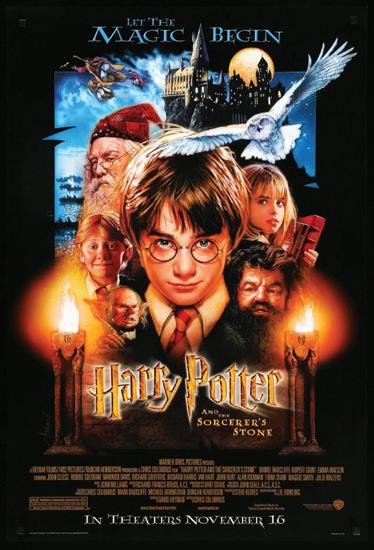
Cati Werbin Arts and Entertainment Editor
For many of us, school can be tough. As the assignments begin to pile on, so does the stress. It can be especially difficult to get back into the routine of studying after a summer of relaxation. To start off the school year strong, it is important to have a study method that works best for you. In fact, according to the program director of psychology at University of Maryland Global Campus Phyllis Medina, studying can be easier and more enjoyable while listening to music. However, it is important to find the right music for the occasion.
SZA is the first artist I go to when pressing play on my study playlist. She is the perfect artist to listen to while studying, as many of her songs contain smooth and calming mel odies that are not too loud or overwhelming enough to divert focus. Some of my favorites by SZA for studying are “Good Days,” “Open Arms” and “20 Something.”

Though it may seem niche, I find that instrumentals of existing songs or beats and tunes meshed together without lyrics make great study music. Listening to melodies and rhythms without lyrics can be beneficial for studying, as it serves as calming background music that is not distracting like upbeat music with lyrics can be. Some of my recommendations are “A Bird’s Last Look” by Macabre Plaza or “Wild Irish Roses” by Smino.
Giveon is well-known for his deep voice with songs that contain soothing melodies, bringing instant feelings of calmness with every listen. Listening to his music whenever I feel overwhelmed fills me with ease and tranquility, which is especially helpful in setting the mood for a smooth study session. Some of my favorites by Giveon are “Like I Want You,” “Vanish,” “Another Heartbreak” and “Heartbreak Anniversary.”
Frank Ocean is another go-to of mine when it comes to study music. Though he has not released new music in a while, his older albums “Blonde” and “channel ORANGE” contain songs that bring a relaxing vibe to the study environment. Some of my favorites to listen to while doing homework are “Ivy,” “Thinkin Bout You” and “White Ferrari,” as they are all songs with slow rythyms that allow me to focus on my work while still having the calming music in the background.


Jonah Mitre Reporter
From the hymns of ancient Mesopotamia to modern-day pop, music has evolved into an intricate and vast art form. As of November of 2023, Spotify had over 6000 genres of music. Given this diversity, it can be hard to identify your genuine music taste and preferences if you aren’t already deeply invested in the musical world.
Finding your genres requires patience. As vocal music and theater teacher Samuel Grob puts it, “getting surprised is surprisingly difficult.” If genres you are already familiar with aren’t quite resonating with you viscerally or lyrically, it might take time and different strategies to find one that does.
To find music, I recommend using tools like Shazam that identify a song being played, to their maximum benefit. If you hear a song while in public or on an app like TikTok that speaks to you, drop everything and find out what it is. Whenever you hear music that interests you, I recommend finding the song title so you can learn more about the song and artist.
Another good way to discover different types of music is through the people around you. Pay closer attention to what music your friends, parents and siblings listen to. Ask to trade playlists, albums or artists with your peers. Friends and family, especially

of different age groups, can be a great way to find artists across a vast range of popularity and genres. For junior Danny Sager, listening to music played by his dad completely diversified his music taste.
“When I was growing up, I heard the Beatles a bunch because my dad loved them, but he would always play a very selective [set] of Beatles,” Sager said. “I would hear 40-50 percent of their songs, leaving a whole other 50 [percent] to learn about… Because he had never played them, it felt like I was finding a whole magic collection when I finally got to listen to songs.”
Once you have a baseline song, artist, genre or album you like, finding new kinds of music can become pretty easy with all the current algorithms and services that exist, as long as you apply them.
Many people are subscribed to Spotify or Apple Music, yet don’t use the radio playlists based on artists, specific songs or the personalized weekly discovery playlist, which both Grob and Sager identified as especially helpful. If you’ve just begun exploring a genre, I suggest looking up Spotify playlists or running simple Google searches like “best [genre name] albums” or “artists like [artist/album]”. This is going to be a great way to begin exploring a genre, as





they will introduce you to what many will consider the definitive representations of that genre.
If you want to get invested in a certain genre of music, specialized sources offer even more insight. Rating sites like Rate Your Music or Album of The Year are great tools for music discovery, covering the community-picked best albums within an wide range of subgenres and offering other discoveryrelated services. Looking at an artist’s influences on Wikipedia, reading music review publications or attending music festivals are other ways to get more musically invested.
Lastly, if you’re someone who has been listening to many types of music for an extended period of time, it may be beneficial to return to music you used to listen to. You may possess the urge to immediately react with judgment regarding your old music, or you may come to happily relive the musical experience you had once heard before. Either way, it is completely natural for your opinions regarding music to transform overtime.
“Sometimes I’ll look back at what I used to listen to, and my first instinct will be to judge it and be like, ‘Oh my god, I can’t believe I used to like that,’” Grob said. “Don’t. It’s not a good or a bad thing. You just evolve always with music.”


Explore music rating sites such as Rate Your Music and Album of the Year Attend concerts or music festivals with friends

Google best albums or artists within a genre or that are similar to another artist
Maiya Blumenthal OpinionEditor
Going into the summer, sophomore Gillian Krauthamer planned to dedicate time to training for the upcoming tennis season at tennis camp. During her training, Krauthamer began experiencing arm pain, causing her to switch sports and plan to join the cross country team instead of the varsity girls tennis team this fall. She had participated on the varsity girls tennis team for the past three years.

“[Choosing to be on the cross country team instead of tennis team] was such a hard decision for me that I had to debate all summer,” Krauthamer said. “I’m not quitting tennis indefinitely and I hope to get back to it, but physically it wasn’t going to be good for me.”
Krauthamer had already participated on the winter and spring track teams in past years, giving herself a familiarity with
After rediscovering his love for soccer during his sophomore season, junior Dylan Kobrin is motivated to continue playing and improving his skills coming into his junior season.
In the beginning of high school, Kobrin chose to focus more on personal fitness, despite his experience playing on club soccer teams in the past. However, as preparation for the upcoming soccer season Kobrin revolved his workouts specifically around soccer training.
“To get ready for the season I like to focus on a lot of cardio because soccer is a big running sport,” Kobrin said. “I try to do a lot with the ball, replicating the game and just staying in shape.”
Kobrin mainly trained for soccer in casual ways, whether it be individually through cardio training, work-
the sport. To train for the upcoming cross country season, Krauthamer followed head track and field coach Jason Belinkie’s summer training schedule, but also adjusted it to be more flexible so she could enjoy her summer in other ways. She mostly ran every day, varying distances and times, but also took breaks to let her body rest.
“I knew I had to keep running to keep my endurance up,” Krau thamer said. “So I ran, one, be cause I like running but also, two, because I knew if I stopped run ning it would be harder to build my endurance back up.”


ing out with friends or in group pick up games.
“I’ve just gotten a lot more into soccer since I joined the JDS team,” Kobrin said. “I look forward to continuing to play competitively this fall.”
MORE FROM THE SUMMER SEASON

Rachel Fagin
Junior Rachel Fagin plays volleyball year-round. She plays on the CESJDS team during the fall season and a club team in winter and spring. However, she used the summer as a break from playing competitively.
Fagin plays different positions on her two teams. For her club team, she plays back row where she focuses on serving, receiving and defense. For the JDS team, she plays outside and right side hitter. To prepare for these positions, Fagin used the summer to focus on all mechanics.
Fagin mainly did her volleyball training with equipment she has in her house that focuses on the skills she wants to improve, leaving her time to spend her summer in other ways.
“I work a lot on just having fun before school tryouts,” Fagin said. “For me high school tryouts are a lot less of a stressor compared to club tryouts and so I try to just relax and enjoy myself more.”
24 Jewish, non-Israeli athletes competed in the Paris Olympics
21 Jewish athletes won Olympic medals 88 Israeli athletes competed in the Olympics
7 Olympic medals won by Israel
1

Leora Blumenthal Reporter
While most CESJDS students head to camp or go on vacation during the summer, some spend their time training and playing their favorite sports. One avenue for them to do so is participating in summer sports programs, which allow them to use the summer to improve their skills.
One popular summer sports opportunity is 6 Points Sports Academy, a Jewish overnight camp in Greensboro, North Carolina. At 6 Points, campers have an experience focused around the development of their athletic abilities. Sophomore Eve Sharp has been attending 6 Points for three years and feels she benefits from the athletic environment.
“The community of Jewish athletes is really strong,” Sharp said. “I think that even if we are all not playing the same sport, we still bond over our love for sports.”
A day at 6 Points consists of two major blocks during which campers practice their chosen sport. Sharp’s chosen sport is soccer, but other options include basketball, gymnastics, softball, swimming, tennis and volleyball.
Each day also includes a minor block, where campers can participate in sports for fun. They can play a different sport from their focus, or play new ones such as pickleball or spikeball.
“The schedule is really great because it gives me time to im-

2
prove in soccer, while also having the chance to try out new sports that I otherwise wouldn’t have tried,” Sharp said.
Another popular summer sports program for JDS students is the Maccabi games, a Jewish athletic competition. There are games in Israel every four years and international tournament destinations every summer.
Junior Matty Stillman has played basketball in these games as a part of the Maccabi USA team twice: in Fort Lauderdale in 2023 and in Houston in 2024.
“It was a really good experience not only just to play basketball, but also to meet so many other Jewish athletes,” Stillman said.
Senior Dalia Epstein played volleyball in the Maccabi games in Israel in 2023. She found she was able to improve her volleyball skills because of the support of her teammates who had been playing volleyball for much longer than her. Epstein said that playing volleyball over the summer at Maccabi gave her a new set of skills and experiences.
An aspect about the Maccabi games that many enjoy is the diverse backgrounds of each member of the team.
“Especially when you go to a small school, you don’t really get to play with as many different people,” Epstein said. “It was just cool seeing how other people play and getting advice from totally different people.”
THE PROGRAM TO THE ATHLETE
3
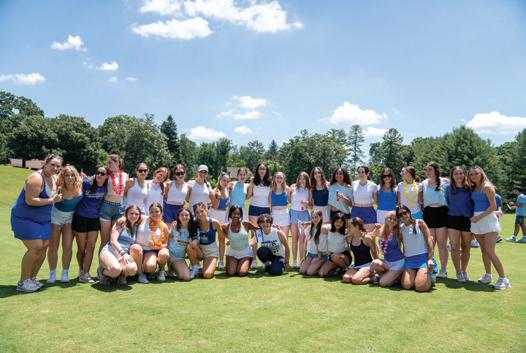
Maya Greenblum Guest Writer Eliana Wolf SportsEditor
Michigan-Ohio State. DukeUNC. Oklahoma-Texas. These sports rivalries are some of the biggest in college athletics, with many Americans anticipating these games all year. Even among less popular rivalries, college sports are a cornerstone of the university experience and a way to build a strong and a prideful community.
The National Collegiate Athletic Association (NCAA), is the non-profit organization that manages intercollegiate athletics. According to ESPN Front Row, in the 2022-2023 season alone, the NCAA aired 27,600 college sports events across ESPN platforms, which is, on average, 89 events per day. ESPN’s
It’s special to see [the players’] journeys, and their experiences adjusting to college.” “
-junior Matty Stillman
most viewed college sports for the 2022-2023 season included football, gymnastics, basketball and many more. Downloading the NCAA app is a great way to keep up with scores.
While it might not be the most economically-conscious choice, the best way to watch college sports is attending live games at the university. Fans can feel the energy of the crowd, participate in traditions and immerse themselves in the experience. Throughout the college sports seasons, the University of Maryland hosts many sporting events that attract local fans, including CESJDS students.
For fans who are not able to attend the games in-person, a great alternative is to watch the many college sports games that are broadcasted on major networks like ESPN, CBS Sports and Fox Sports, accompanied by commentary on the game from sports analysts. Platforms like ESPN+, Hulu Live and YouTube TV offer live streaming on smartphones, tablets and televisions, making it easy to watch games online. Junior Matty Stillman is an avid sports fan, and watches many games online.
“Watching [college sports] on TV, you can see the spirit of the schools, all the fans going crazy,” Stillman said.
One of the most popular college sporting events across the United States—and within the JDS high school—is March Madness, a single elimination contest for college basketball teams. According to the NCAA, the 2024 Division I Women’s Basketball Championship averaged 18.7 million viewers on ESPN and ABC and peaked at 24 million viewers, making it the most-watched women’s basketball game ever. The 2024 Division I Men’s Basketball Championship averaged 14.82 million viewers, slightly more viewers than in 2023.
Following March Madness with JDS is a perfect way to keep up with the scores, as JDS takes March Madness very seriously. The Sports Analysis Club spearheads brackets throughout the middle and high school and brings excitement around the tournament. It is recommended to lean into the programming that the school offers, as it brings a sense of community around sports at JDS in addition to the community of college sports fans.
“College sports are really important because it’s a middle ground between high school and becoming a professional






player, a step in the next direction,” Stillman said. “It’s special to see [the players’] journeys, and their experiences adjusting to college.”
Although the ranking of each team changes season to season, there are some consistently high ranked schools. Many of those colleges pride themselves on their sports teams, building communities upon sports traditions, fandom and school spirit. These schools are incredibly exciting to follow, and a must-watch for the big games. With the strong sense of university pride coupled with high level athletics, the games have a professional-level feel while still playing into the university rivalries.
As JDS students transition into college, it is important to emphasize the value of attending and supporting university teams. High school math teacher and Jewish life chair Robbie Shorr followed his college’s sports, and even though his college was Division III, he found a relatability factor in the athletes he was watching, as they had the same academic experience as Shorr.
Even among schools without intense athletic programs, college sports serve a greater purpose than they let on. They foster community not only among the players but among fans as well, creating a sense of community within schools. As a result, knowing how to follow college sports is a vital first step to joining the vibrant community of college sports fans.
“[The athletes’] emotion is so much more than the pros, because for many of them, especially the seniors, it’s their last [season],” Shorr said. “They’re not going to the next level, ninety percent of those people, So, the highs and lows, emotionally, are really intense. And I think that makes a really good fan experience.”
High school teacher coaches four sports
Adam Salomon Reporter
Instead of heading home after a long day at CESJDS, middle school history teacher Matthew Jacobson stays on campus to coach. Jacobson grew up surrounded by sports–playing and watching–but felt that he was never really good at them. He had the sports strategy and knowledge down and figured that if he wanted to stay in the game, he should get into coaching. Jacobson is now known as Coach Jacobson to many students in the middle and high school, although he has also been a teacher for five years.
Jacobson was hired to teach at JDS in 2020. At the time, he was coaching football at Walter Johnson High School (WJ) and was getting ready to begin coaching middle school baseball at JDS as the assistant coach. However, the 2020 and 2021 seasons never occurred due to COVID-19.
The following season Jacobson was offered the head coach position for JDS middle school baseball, which he instantly accepted. According to Jacobson, middle school baseball is his Jacobson’s favorite team he’s ever coached because in his first year being a head coach, the team went
1 2 3
Jacobson played a year on his high school varsity football team.

Jacobson was captain of his high school varsity ultimate frisbee team.

on to win the Potomac Valley Athletics Conference championship.
“[Coaching] really provides me with an opportunity to get to know kids that I teach in kind of a different light, different environment, particularly as a head coach of the middle school baseball team,” Jacobson said. “It gives me an opportunity to really have a direct hand in the development of not just athletes, but of young men as well.”
In the 2023-24 school year, Jacobson accepted the role of the head coach of the middle school boys soccer team because he was no longer coaching football at WJ. Later in the winter, he was offered the assistant coach position for the junior varsity boys basketball team. Although he had never coached soccer or basketball, he accepted both offers.

Jacobson’s role as Walter Johnson’s football team’s defensive coordinator became too much for him because he was balancing his busy teaching schedule with a football schedule. He will be returning next season as the Walter Johnson’s varsity quarterback and wide receiver coach, and is excited to focus on the positions that really got him interested in coaching the sport.
Sophomore Noah Sacks was on Jacobson’s championship baseball team as a starter and key pitcher. He was a captain on the team in eighth grade and was also on the JV basketball team this past year.
The most famous person on his phone is former Head of National Football League Players Association Demora Smith.

“He did a really good job [coaching] and he definitely improved as the years went on, and it was good that as we were growing as players he was growing as a coach,” Sacks said.
Jacobson has developed key relationships with his players including eigth grade student AJ Saltz, his captain for his middle school baseball team. This past year Saltz says he was able to learn from his coach on how to be a better leader as a captain.
“Having a younger coach is really nice, because he connects and relates to you more, so it’s been really fun,” Saltz said. “In terms of learning about the game he’s given some good advice.”
Jacobson has felt that coaching at JDS has really given him an opportunity to develop a direct hand in the students’ development as athletes, but also as young individuals. He feels that he really has a chance to get to help kids in a different environment from just the classroom.
“Teaching and coaching really do go hand in hand and I write lesson plans, I deliver lesson plans, just like I write practice plans and deliver those practice plans,” Jacobson said. “The ultimate goal is that when we send you guys out of here in February of your senior year, that not only have you learned things in the classroom, but you’ve learned how to be good people. And I think sports are one of the best vehicles to help form young people into good people.”
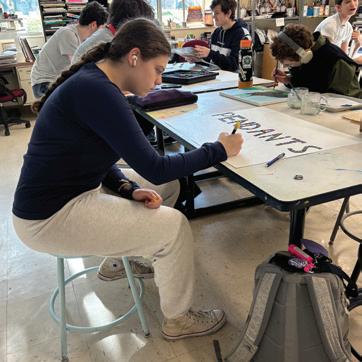

Z’man Kodesh (ZK), or holy time, is a period of reflection and prayer ranging from 30-55 minutes every day. There are 10 different ZK offerings in the high school to help accommodate the needs of the pluralistic community.
